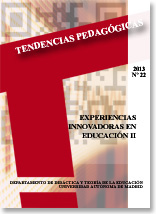Keywords:
University, extitution, service learning, social transformation, education.Copyright (c) 2015 Tendencias Pedagógicas

This work is licensed under a Creative Commons Attribution-NonCommercial 4.0 International License.
Abstract
The pedagogical relationship in universities should change if we pretended to obtain citizens with a professional profile who are committed with the social reality. This change should be made at least on three of the various levels involved: on institutional level, on academic level and on student level. To achieve this we need to "invent" new scenarios for the educational action, deliver autonomy to the educational process and re-install a sense to the learning process. And one of the proposals that could fit in this change could be the so-called service learning, although there are surely many more to which attention should be paid. In summary, if we attend the real needs of education, there might exist the possibility that we do not throw into the abyss those marionettes of a cyclic reality of the same orthopaedic educational process, but that we point out on other forms of knowledge transfer meaning that we prefer to educate real professionals capable to transform the world and responsible for their own learning process. That way, changing the rules of the game, it might be possible to understand that our interest for the educational process is much stronger than for the institution; and that what we really want is to educate responsible individuals and not to “manufacture” talents; as what really is of interest is to unite efforts for a transformation of a society of which everyone who belongs to it should feel proud of. Everyone, because we can only achieve this pride if we are convinced that everyone counts in it.Downloads
References
BÁRCENA, F. (2000). «El aprendizaje como acontecimiento ético. Sobre las formas del aprender». Enrahonar. Cuadernos de filosofía, (31) , pp. 9-33.
CURBET, J. (2011). Un mundo inseguro. La búsqueda de la seguridad en la sociedad del riesgo. Barcelona: Universitat Oberta de Catalunya.
DEBRAY, R. (1997). Transmitir. Buenos Aires: Manantial.
DOMÈNECH, M., & TIRADO, F. (2001). «Extituciones: del poder y sus anatomías». Política y sociedad, 36 , pp. 191-204.
DOMÈNECH, M., TIRADO, F., TRAVESET, S., & VITORES, A. (1999). «La desinstitucionalització i la crisi de les institucions». Educació Social , 12, pp. 20-32.
EWALD, F. (1989). «Un poder sin afuera». En E. BALBIER, Michel Foucault, filósofo. Barcelona: Gedisa.
FERRATER MORA, J. (2009). Diccionario de filosofia. Barcelona: Ariel.
FOUCAULT, M. (1984). «El juego de Michel Foucault». En M. FOUCAULT, Saber y verdad, pp. 127-162. Madrid: La Piqueta.
FOUCAULT, M. (1975). Vigilar y castigar. Nacimiento de la prisión. Madrid: Siglo XXI.
GOFFMAN, R. (1961). Internados. Ensayos sobre la situación social de los enfermos mentales. Buenos Aires: Amorrortu, 2001.
HEGEL, G. (2000). Fenomenología del espíritu. Madrid: Fondo de cultura económica.
MEIRIEU, P. (1998). Frankenstein educador. Barcelona: Laertes.
PUIG, J. M. (2009). Aprendizaje servicio (ApS): Educación y compromiso cívico. Barcelona: Graó.
SERRES, M. (1994). Atlas. Madrid: Cátedra.
